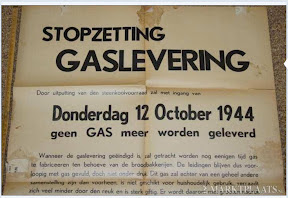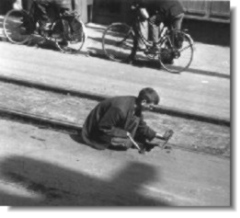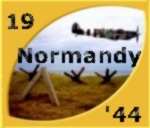 One way to enlarge the rations was buying food at the black market. The prices on the black-market were of course out of reach for the majority. Another way to get food was to go into the country and beg the farmers for food. Trading jewelry or other valuables was another option. Many women made long trips by bike or even on food to reach parts of Holland where there still was food available. If someone had family or friends in other parts of Holland they turned to them for help. One woman told the author that she went all the way to the "Achterhoek" where she had family. The Achterhoek is a region in the east part
One way to enlarge the rations was buying food at the black market. The prices on the black-market were of course out of reach for the majority. Another way to get food was to go into the country and beg the farmers for food. Trading jewelry or other valuables was another option. Many women made long trips by bike or even on food to reach parts of Holland where there still was food available. If someone had family or friends in other parts of Holland they turned to them for help. One woman told the author that she went all the way to the "Achterhoek" where she had family. The Achterhoek is a region in the east part
of the Netherlands. A three to four hundred kilometer round trip by bicycle. People who didn't have family or friends elsewhere had to knock on the doors of strangers for help. The men that had not yet been send to Germany to work there could not go on these hunger trips because the chance was very big that they would get picked up by the Germans and sent to Germany.
 Imagine walking or cycling for three to four days in a row. You are weak because you have little or maybe even nothing to eat. The threat of Allied fighter planes that attack the roads is sadly enough a serious one. Then there is the German Sigherheidspolitzei and their Dutch collaborators, always helpful to relief you from your bicycle and any food you might have bought or received on your hunger trip. Imagine walking or cycling for three to four days in a row. You are weak because you have little or maybe even nothing to eat. The threat of Allied fighter planes that attack the roads is sadly enough a serious one. Then there is the German Sigherheidspolitzei and their Dutch collaborators, always helpful to relief you from your bicycle and any food you might have bought or received on your hunger trip.
The bicycles that the Germans still hadn't laid their hands on didn't have their tires anymore. Rubber was as hard to get as just about anything else and the people drove on wooden tires or even on the rim. In the picture of the young skinny boy that is trying to get wood from the tram-rails, two bicycles can be seen in the background. Both bicycles are missing their rear tired.
The winter of '44 - '45 was a severe one. The Americans all know the stories of the cold winter of December 1944. The Germans launched their counteroffensive in the Ardennes. The winter in Western Holland was not just as cold as in the Belgian Ardennes, where frostbite became a serious problem for the American army, but it added gravely to the already existing misery.
Not only the food lacked during the hunger winter. The coal supplies that kept stoves and central heating burning were also practically gone. People made little burners out of empty oil drums, so that they could heath the little food they had, with anything that would burn.
Many city parks lost their trees in this period. The "Vondelpark" in Amsterdam was closed in November 1944 because almost all trees were stolen. Although it was illegal to be outside at night and just as illegal to chop trees down, many people snug into the forests and parks at night and stole the young trees.
<< BACK FORWARD >>
|










 Imagine walking or cycling for three to four days in a row. You are weak because you have little or maybe even nothing to eat. The threat of Allied fighter planes that attack the roads is sadly enough a serious one. Then there is the German Sigherheidspolitzei and their Dutch collaborators, always helpful to relief you from your bicycle and any food you might have bought or received on your hunger trip.
Imagine walking or cycling for three to four days in a row. You are weak because you have little or maybe even nothing to eat. The threat of Allied fighter planes that attack the roads is sadly enough a serious one. Then there is the German Sigherheidspolitzei and their Dutch collaborators, always helpful to relief you from your bicycle and any food you might have bought or received on your hunger trip. 